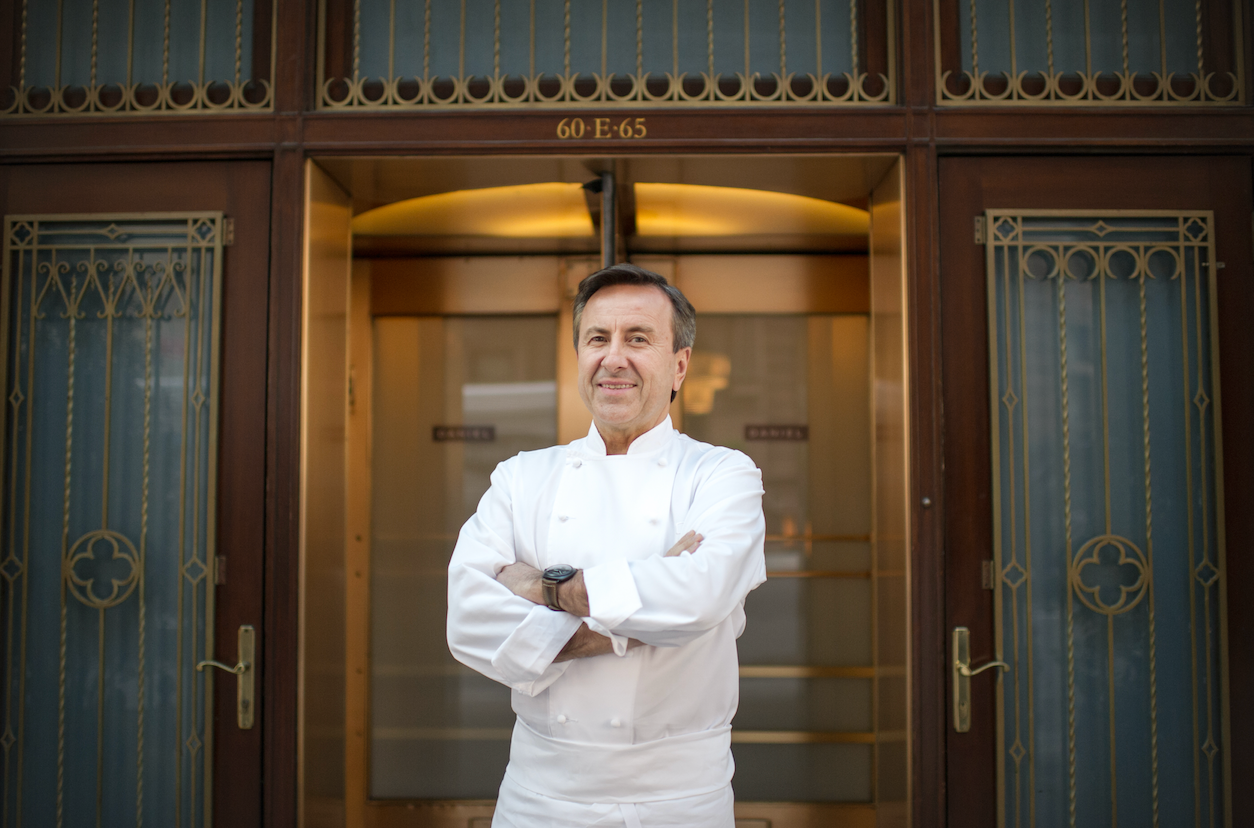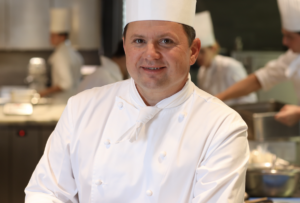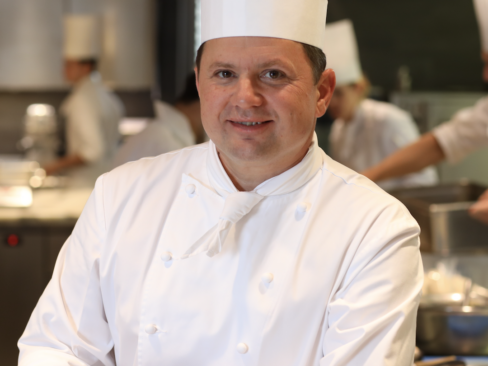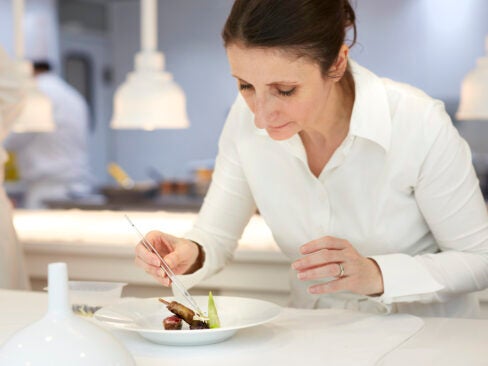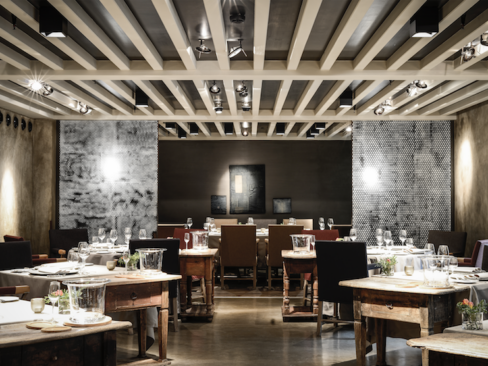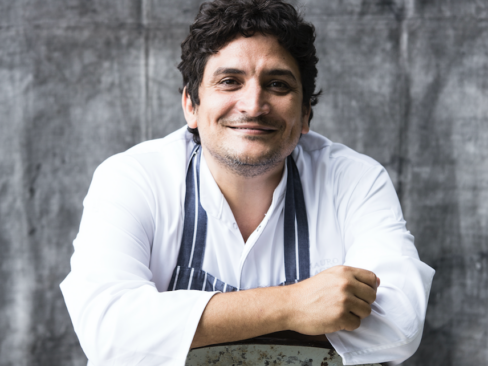Although Boulud describes his role as that of a micromanager, the French-born chef, with multiple Michelin stars to his name, is not one to control the chefs who work under him. Instead, he uses the term only to explain his involvement in all aspects of the business, from marketing to design, human resources, public relations, and — perhaps most important — recipe development and menu planning. “Dishes are not coming from one individual,” he says. “They’re coming from everybody’s collaboration together. It’s a collective work. It’s definitely a form of partnership the way we are working here.”
With a culinary empire that spans the globe — and a four-decade career — chef Daniel Boulud is an authority on decadent food and dedicated service. This year, as Daniel, his heralded fine-dining restaurant in New York, celebrates its silver anniversary, and Boulud receives the Elite Traveler Lifetime Achievement award, Boulud prepares for even bigger things to come.
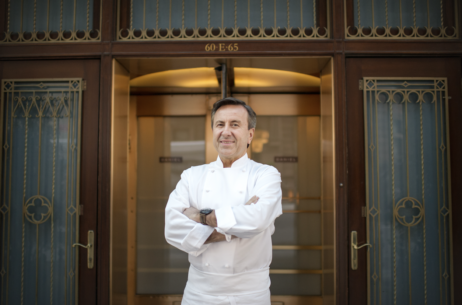
Daniel Boulud, courtesy of Daniel Krieger
From his seat inside the skybox, a glass-walled private dining room set 10 ft above the kitchen at Daniel, chef Boulud takes a brief moment to survey his team. “My role has always been to micromanage a lot of things,” he says. “I’m interested by everyone’s job and performance and responsibilities. I am the pillar of this organization, so, of course, it often gravitates around me.”
Boulud’s desire to be connected to all facets of his culinary business can be traced back to his six-year tenure as the executive chef at New York’s Le Cirque, which began in 1986. During that time, Boulud was running the esteemed French restaurant’s kitchen — earning coveted four-star reviews in The New York Times along the way — and also writing the first of his cookbooks. In those days, the restaurant was not as corporately structured as his enterprise is today — there was no public relations team, for example — which meant that Boulud had his hand in most aspects of the business out of necessity.
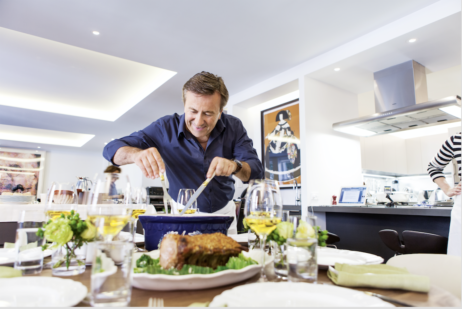
Daniel Boulud, courtesy of T. Schauer
The varied business experience that Boulud received at Le Cirque may have conditioned the chef for his future role as head of a sprawling and ever-growing culinary empire some 30 years later, but it was the vitality of the restaurant’s dining room atmosphere that convinced Boulud to root his aforementioned empire in Manhattan. “I was shocked by the positive energy of the restaurant, and this energy coming from the most famous people who run this country in all categories of business and entertainment,” he recalls. “Having worked in [Michelin] three-star and two-star restaurants in France, I’d never seen such power and energy together in the same room. You pushed the door and you felt the energy coming at you, you felt the power of the room and you felt the staff being so focused, busy and courteous. It was everything in one room.”
During those years, Boulud learned a great deal from Le Cirque’s owner, Sirio Maccioni, whom the restaurant’s staff affectionately called ‘the ringmaster’ for his ability to control and work the dining room. But the chef was equally inspired by the restaurant’s wide-ranging appeal. As he fondly remembers, Le Cirque could be the locals’ “favorite hangout place, but also the place to celebrate, the place to party, the place to just drop by.”
When Boulud opened his first restaurant, Daniel, on 76th Street on New York’s Upper East Side, it immediately followed the path that Le Cirque had blazed, offering an uncommon combination of elegant food, service, ambiance and a varied cast of patrons on any given night. “I wanted Daniel to be a fun fine-dining restaurant, and it was always packed to the nose,” says Boulud. “The restaurant was an incredible melting pot of customers who were very loyal. It was basically impossible to get in unless, before you left the restaurant, you could talk to the maître d’ eye-to-eye and ask him to put you at a table for your next visit.”
Five years later, Boulud moved Daniel a dozen blocks south to its current location, opening Café Boulud in Daniel’s place on 76th Street. The creation of Café Boulud, which became a neighborhood restaurant for the Upper East Side (albeit one with a Michelin star to its name), was a catalyst for the chef’s further expansion both in New York City and beyond. Today, Boulud oversees almost 20 restaurants around the globe; however, launching Café Boulud also allowed the chef to transform Daniel from a “casual and chic” restaurant in its previous location to one that was “more palatial and grand.”
That Boulud’s first — and most elegant — restaurant is celebrating its 25th anniversary this year is a testament to the restaurateur’s business savvy, not to mention his vision and willingness to embrace change. A multimillion-dollar renovation and redesign of the restaurant will begin this year, although the significance of the first phase of the project will be noticeable only to those who dine in Boulud’s skybox. A bevy of new kitchen equipment, including a $300,000 stove, will position the restaurant for continued success and even greater culinary creativity in the future. Those enhancements will also impact the quality of the restaurant’s service, as Boulud acknowledges that they are likely to infuse the staff with greater enthusiasm and a stronger affinity for where they work. “We try to constantly make it a better place not just for the customer,” he says, “but for us, the team, as well.”
The second phase of the redesign project will address the restaurant’s main dining room and lounge area and, as Boulud describes, it will be a marriage of classic and modern forms. It may even look and feel less formal, as Boulud suggests that table settings and table skirts could drastically change. “Maybe not so long as down to the floor,” he says of the proposed new table skirts. “Maybe a little miniskirt,” he adds with a laugh, “but then we have to have nice legs, so we’ll have to change the foot of the table.”
What has continuously changed, albeit gradually over the past quarter-century, is the cuisine that Boulud serves at Daniel. Seasonality and a focus on individual ingredients continues to be the muse that inspires the restaurant’s entire team of chefs. Boulud points to a four-year partnership with a lamb purveyor based on the northeastern coast of the Gaspésie, a region of Quebec north of New Brunswick. There, the lambs’ diet of grasses that are constantly sprayed by ocean mist imparts a distinct — and, as Boulud opines, “fabulous” — mineral quality to the meat’s flavor. “It starts with these ingredients, and then [we ask] how are we now going to express ourselves around these ingredients?” Boulud explains. “Or sometimes it can be an idea of a recipe, like we want to go back to a French classic but we want to give it a twist.”
A perfect example is canard à la presse, a dish that literally requires a twist from a silver-plated antique meat press — an apparatus with a history that predates 1890 — which rests on display in Boulud’s skybox. It is a seemingly uncomplicated dish, roasted duck served in a sauce enhanced by its own juices, yet it requires five days of preparation, and Boulud only makes it when specially ordered. Though the dish is thought to have originated around 1840, the recipe Boulud uses was penned during the Great Depression and utilizes a Port-and-red-currant-jelly marinade. Boulud has also been known to uncork birth-year vintages of red wine for guests who order the dish, adding a splash of that well-aged wine to the already decadent sauce (the remaining wine, of course, is poured as an ideal pairing when the dish is served).
Looking ahead, Boulud has plans to shake up New York’s fine-dining landscape yet again when he opens a new restaurant in the skyscraper currently under construction at One Vanderbilt Avenue near Grand Central Terminal. Still in its conceptualization, the restaurant, which is slated to open sometime in 2020, will represent a divergent interpretation on fine dining from what Boulud has fastidiously preserved at Daniel.
“While I want to maintain at Daniel a certain elegance, comfort and style, there it will be more contemporary but classic still,” he says. “It will be a departure from the more traditional French, a timeless, classic New York–style restaurant. Or it could be French, for that matter, but at least it will be interesting and different.” The new venture reflects a seismic shift in the definition of fine dining, one that Boulud could see developing in the late 1970s during his days as a sous chef and chef de cuisine in Copenhagen. “In the old days, fine dining was kept with the French,” he says. “And then it grew. Danish chefs at the time were all trained within the decade in France, and they all came back home and started to make their own cuisine with their own ingredients. You could really see already the stimulation of creativity but also the proper training for them… a certain French foundation… as a base.”
Boulud suggests that today perhaps 20 percent of fine-dining restaurants around the world are delivering an elevated dining experience in a nontraditional way. Yet for Boulud, fine dining is akin to staying at the most superlative luxury hotel. “This sense of luxury is something you maybe cannot access in your home,” he says, “but it feels good to go and give it to yourself for a short time.”
Using that criterion, those “disruptive” restaurants, as Boulud describes them, may not neatly fall within the parameters of traditional fine dining, but he says “they are definitely in the category of fine food and creativity and originality. “One thing is for sure,” he adds, “the new generation is able to access fine dining through more casual restaurants, and in a more comfortable way.”
As for any accolades that Boulud, his team and his restaurants may earn, the chef places an emphasis on those — such as Elite Traveler’s Top 100 Restaurants in the World list and this year’s Elite Traveler Lifetime Achievement award — that are a reflection of his patrons’ experiences. “I’m very proud of the distinction, especially as we gear up to celebrate 25 years of Daniel and 20 years of Café Boulud in New York.
However, I am excited for all the new projects on the horizon and don’t intend to stop here. There is still a lot to come, and I look forward to continuing the hard work and giving back to everyone who has been supporting me since I arrived in New York.
“I want the guests to be the judge of where I belong,” he adds. “I can live well with two [Michelin] stars forever. Do I wish to have three stars one day? If I deserve them, yes. But do I want to change everything because I got three? No. I want to stay who I am and what I am, and keep how we do things. I want to keep evolving and keep improving and keep stimulating the team to become ever more creative. It’s very rewarding for everyone,” he continues, “because we feel it’s not an individual’s opinion. It’s [decided by] who we cook for every day.”





